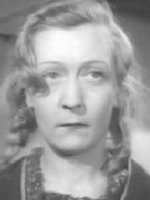Ambrosine Phillpotts is a Actor British born on 13 september 1912 at London (United-kingdom)
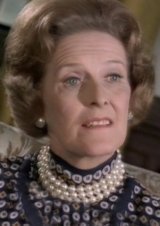
Ambrosine Phillpotts (13 September 1912 – 12 October 1980) was a British actress of theatre, TV and film. The Times wrote, "She was one of the last great stage aristocrats, a stylish comedienne best known for playing on stage and screen a succession of increasingly 'grandes dames' with an endearing mixture of Edwardian snobbery and eccentric absent-mindedness".
Au cinéma, elle contribue à vingt-neuf films, majoritairement britanniques, sortis entre 1946 et 1980 (année de sa mort, à 68 ans).
Citons L'amour mène la danse de H. Bruce Humberstone (1951, avec David Niven et Vera-Ellen), Qu'est-ce que maman comprend à l'amour ? de Vincente Minnelli (film américain, adaptation de la pièce précitée The Reluctant Debutante, 1958, avec Rex Harrison et Kay Kendall), Les Chemins de la haute ville de Jack Clayton (1959, avec Simone Signoret et Laurence Harvey), Life at the Top de Ted Kotcheff (suite des Chemins de la haute ville, 1965, avec Laurence Harvey et Jean Simmons), ou encore Le Cercle de sang de Jim O'Connolly (1968, avec Joan Crawford et Ty Hardin).
À la télévision, Ambrosine Phillpotts apparaît dans huit téléfilms (parfois d'origine théâtrale) dès 1946 et jusqu'en 1973. S'ajoutent vingt-sept séries entre 1957 et 1978, dont One Step Beyond (un épisode, 1961) et Angoisse (un épisode, 1974).
Source : Wikidata
Ambrosine Phillpotts

- Infos
- Photos
- Best films
- Family
- Characters
- Awards
Birth name Ambrosine Marie Phillpotts
Nationality United-kingdom
Birth 13 september 1912 at London (United-kingdom)
Death 12 october 1980 (at 68 years)
Nationality United-kingdom
Birth 13 september 1912 at London (United-kingdom)
Death 12 october 1980 (at 68 years)
Ambrosine Phillpotts (13 September 1912 – 12 October 1980) was a British actress of theatre, TV and film. The Times wrote, "She was one of the last great stage aristocrats, a stylish comedienne best known for playing on stage and screen a succession of increasingly 'grandes dames' with an endearing mixture of Edwardian snobbery and eccentric absent-mindedness".
Biography
Ambrosine Phillpotts débute en 1930 au théâtre, où elle joue jusqu'en 1976, notamment dans sa ville natale. Mentionnons Hamlet de William Shakespeare (1934, avec Esmond Knight et Sybil Thorndike), The Morning Star de (et avec) Emlyn Williams (1941), The Reluctant Debutante de William Douglas-Home (1955, avec Wilfrid Hyde-White et Celia Johnson), Thark de Ben Travers (1965, avec Peter Cushing et Alec McCowen), ainsi que Tables séparées de Terence Rattigan (1971, avec John Mills et Jill Bennett).Au cinéma, elle contribue à vingt-neuf films, majoritairement britanniques, sortis entre 1946 et 1980 (année de sa mort, à 68 ans).
Citons L'amour mène la danse de H. Bruce Humberstone (1951, avec David Niven et Vera-Ellen), Qu'est-ce que maman comprend à l'amour ? de Vincente Minnelli (film américain, adaptation de la pièce précitée The Reluctant Debutante, 1958, avec Rex Harrison et Kay Kendall), Les Chemins de la haute ville de Jack Clayton (1959, avec Simone Signoret et Laurence Harvey), Life at the Top de Ted Kotcheff (suite des Chemins de la haute ville, 1965, avec Laurence Harvey et Jean Simmons), ou encore Le Cercle de sang de Jim O'Connolly (1968, avec Joan Crawford et Ty Hardin).
À la télévision, Ambrosine Phillpotts apparaît dans huit téléfilms (parfois d'origine théâtrale) dès 1946 et jusqu'en 1973. S'ajoutent vingt-sept séries entre 1957 et 1978, dont One Step Beyond (un épisode, 1961) et Angoisse (un épisode, 1974).
Usually with
Filmography of Ambrosine Phillpotts (30 films)
Actress
 , 1h31
, 1h31Directed by Frank Launder
Origin United-kingdom
Genres Comedy
Themes Films about education
Actors Sheila Hancock, Michael Hordern, Thorley Walters, Rodney Bewes, Maureen Lipman, Julia McKenzie
Roles Mrs Mowbray
Rating38%





The girls of St. Trinian's hatch yet another fiendish plot—a trade union for British schoolgirls. Their friend and mentor, Flash Harry, suggests a plan which involves kidnapping girls from other rather more respectable colleges and substituting their own "agents". Thus begins a hilarious, often bloody, battle of wits as the girls meet resistance not only from Olga Vandermeer, their Headmistress, but from the Minister of Education, a private detective, and an oil sheikh. Despite all his desperate efforts to foil the conspiracy, the Minister has to face a growing realisation that the girls' demands will have to be met—for him this will mean a very great and very personal sacrifice.
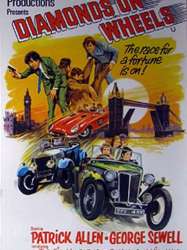
Diamonds on Wheels (1973)
, 1h24Directed by Jerome Courtland
Origin United-kingdom
Genres Adventure
Themes Children's films
Actors Patrick Allen, George Sewell, Barry Jackson, Peter Firth, Derek Newark, Dudley Sutton
Roles Lady Truesdale
Rating63%





Trois enfants se mélangent avec des voleurs de bijoux et de diamants dans un rallye routier de 24 heures de vol.
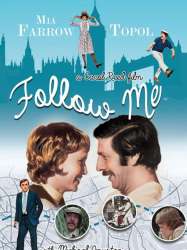
Follow Me! (1972)
, 1h35Directed by Carol Reed
Origin United-kingdom
Genres Drama, Thriller, Comedy, Romance
Themes Films based on plays
Actors Mia Farrow, Chaim Topol, Michael Jayston, Margaret Rawlings, Annette Crosbie, Dudley Foster
Roles une invitée au dîner
Rating68%





Set in London, it is the story of a wealthy businessman (Michael Jayston), who suspects that his wife (Farrow) is having an affair. He hires a private detective (Topol) to follow her. She becomes aware that she is being followed, and the detective realises that she has found out. However rather than abandoning the case, the detective begins an elaborate game of cat and mouse with the complicity of the wife.
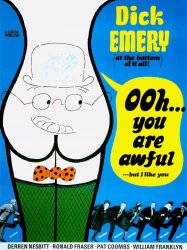
Ooh... You Are Awful (1972)
, 1h37Directed by Cliff Owen
Origin United-kingdom
Genres Comedy
Actors Dick Emery, Derren Nesbitt, Ronald Fraser, Pat Coombs, William Leo Franklyn, Norman Bird
Roles Lady Missenden Green
Rating56%





Conmen Charlie Tully and Reggie Peek have successfully conned a couple of Italian men, and are making an easy escape with £500,000. Flushed with success, Tully is unable to resist running a "quick and easy" minor con on a passing American tourist. But "quick and easy" unexpectedly goes awry, and Tully is arrested. While Tully is imprisoned, Peek manages to escape and deposit the £500,000 in a Swiss bank account. Eventually, when Tully is finally released, he is met by Peek, intending to give him the bank account number. But Peek has been having an affair with the sister of London crime lord Sid Sabbath, and his reunion with Tully is cut short when Peek is murdered, on the orders of Sabbath.
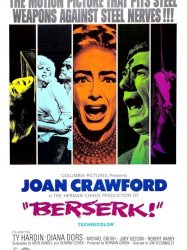
Berserk! (1967)
, 1h36Directed by Jim O'Connolly
Origin United-kingdom
Genres Drama, Thriller, Horror, Crime
Themes Circus films
Actors Joan Crawford, Ty Hardin, Judy Geeson, Diana Dors, Michael Gough, Robert Hardy
Roles Miss Burrows
Rating53%





Un cirque itinérant, dirigé par Monica Rivers, subit une série de drames; plusieurs de ses artistes trouvant la mort au cours de représentations. Et il parait évident qu'il ne s'agit pas d'accidents. Alors qui est le meurtrier ?
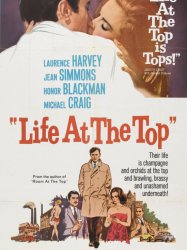
Life at the Top (1965)
, 1h57Directed by Ted Kotcheff
Origin United-kingdom
Genres Drama
Actors Laurence Harvey, Jean Simmons, Honor Blackman, Michael Craig, Edward Fox, Donald Wolfit
Roles Mrs. Margaret Brown
Rating66%





In Room at the Top Joe Lampton's escape from his working-class background through his seduction of, and marriage to, the daughter of a wealthy mill owner had been portrayed.

Carry On Cabby (1963)
, 1h31Directed by Gerald Thomas
Origin United-kingdom
Genres Comedy
Themes Films about sexuality, Erotic films
Actors Sid James, Hattie Jacques, Kenneth Connor, Charles Hawtrey, Esma Cannon, Liz Fraser
Roles Aristocratic Lady
Rating63%





Charlie Hawkins (Sid James) is the workaholic owner of thriving taxi company Speedee Taxis, but his wife Peggy (Hattie Jacques) feels neglected by him. When Charlie misses their fifteenth wedding anniversary, because he's out cabbing, she decides to punish him. Telling Charlie that she's going to 'get a job', she establishes a rival company, GlamCabs. The cars are brand new Ford Cortina Mk1's and driven by attractive girls in provocative uniforms. Flo, the wife of one of Charlie's drivers, gets the post of office manager.
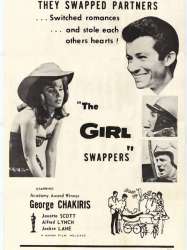
Two and Two Make Six (1962)
, 1h29Directed by Freddie Francis
Origin United-kingdom
Genres Comedy, Romantic comedy
Actors George Chakiris, Janette Scott, Alfred Lynch, Jocelyn Lane, Athene Seyler, Bernard Braden
Roles Lady Smith-Adams
Rating61%






Raising the Wind (1961)
, 1h31Directed by Gerald Thomas
Origin United-kingdom
Genres Comedy
Actors James Robertson Justice, Leslie Phillips, Kenneth Williams, Liz Fraser, Eric Barker, Jennifer Jayne
Roles Mrs. Featherstone
Rating59%






Carry On Regardless (1961)
, 1h30Directed by Ralph Thomas, Gerald Thomas
Origin United-kingdom
Genres Comedy
Themes Films about sexuality, Erotic films
Actors Sid James, Kenneth Connor, Charles Hawtrey, Joan Sims, Kenneth Williams, Bill Owen
Roles Yoki's Owner
Rating60%





Down at the local labour exchange, everyone is moaning about the lack of decent jobs, unaware that nearby Bert Handy and his secretary Miss Cooling are attempting to fill vacancies, at a new enterprise called Helping Hands. When word gets round, people are quick to visit the agency, notably Sam Twist, Francis Courtenay, Delia King, Gabriel Dimple, Lily Duveen, Mike Weston and Montgomery Infield-Hopping. Bert decides to hire them all and at first business is slow. The only customer is a man who speaks gobbledygook but since Francis (who can speak 16 languages) isn't present nobody can understand him and he goes on his way. Within a few days business picks up and Delia has an assignment to try on a complete women's wardrobe for Mr Delling, a gentleman who is planning a surprise for his wife. However things get complicated when the man's wife arrives home unexpectedly.
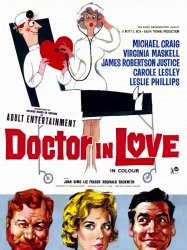
Doctor in Love (1960)
, 1h33Directed by Ralph Thomas
Origin United-kingdom
Genres Comedy
Themes Medical-themed films
Actors James Robertson Justice, Michael Craig, Virginia Maskell, Leslie Phillips, Joan Sims, Carole Lesley
Roles Lady Spratt
Rating57%





Dr Richard Hare is a recently graduated medical intern at St Swithins Hospital. When his new romantic interest, nurse Sally Nightingale, suddenly leaves the hospital, he is devastated. He also leaves after being offered a job in private practice. But when his senior partner, Dr Cardew, has to visit California for a few months, Hare is left in charge. Dr Nicola Barrington joins the practice and Hare is suddenly in love again.
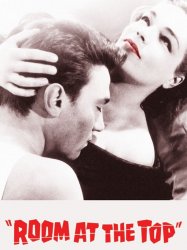
Room at the Top (1959)
, 1h55Directed by Jack Clayton
Origin United-kingdom
Genres Drama, Romance
Themes Films about sexuality
Actors Simone Signoret, Laurence Harvey, Heather Sears, Donald Wolfit, Hermione Baddeley, Donald Houston
Roles Mrs. Brown
Rating74%





In late 1940s Yorkshire, England, Joe Lampton (Laurence Harvey), an ambitious young man who has just moved from the dreary factory town of Dufton, arrives in Warnley, to assume a secure, but poorly paid, post in the Borough Treasurer's Department. Determined to succeed, and ignoring the warnings of a colleague, Soames (Donald Houston), he is drawn to Susan Brown (Heather Sears), daughter of the local industrial magnate, Mr. Brown (Donald Wolfit). He deals with Joe's social climbing by sending Susan abroad; Joe turns for solace to Alice Aisgill (Simone Signoret), an unhappily married older woman who falls in love with him.
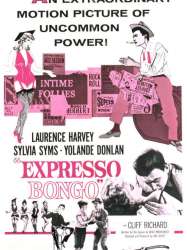
Expresso Bongo (1959)
, 1h51Directed by Val Guest
Origin United-kingdom
Genres Comedy, Musical
Themes Films about music and musicians, Musical films
Actors Laurence Harvey, Cliff Richard, Sylvia Syms, Yolande Donlan, Eric Pohlmann, Hermione Baddeley
Roles Lady Rosemary
Rating61%





Paul Scofield plays Johnny, a slimy, small-time music promoter and talent scout who notices teenage girls going crazy for the singing and bongo playing of talentless and seemingly idiotic Herbert Rudge (played by James Kenny). Johnny rechristens Rudge as "Bongo Herbert" and signs him to a contract that gives Johnny a 50% share of the profits. With Johnny's help, Bongo rockets to stardom. Bongo's success attracts a host of sleazy music industry types intent on exploiting him. Johnny quickly finds himself outclassed in the sleaze department as Bongo turns out to be the slipperiest slime of them all.

Operation Bullshine (1959)
, 1h24Origin United-kingdom
Genres War, Comedy
Themes Military humor in film, Political films
Actors Donald Sinden, Barbara Murray, Carole Lesley, Ronald Shiner, Naunton Wayne, Dora Bryan
Roles Reporter
Rating56%





During World War II, a Royal Artillery officer is assigned to an anti-aircraft battery that is filled with female soldiers of the Auxiliary Territorial Service. His wife who has enlisted is mistakenly posted to the battery in violation of regulations of husbands and wives serving together in the same formation. She becomes jealous of what she perceives as his paying too much attention to the other Auxiliary Territorial Service women.

The Reluctant Debutante (1958)
, 1h35Directed by Vincente Minnelli
Origin USA
Genres Comedy, Romantic comedy, Romance
Themes Films based on plays
Actors Rex Harrison, Kay Kendall, John Saxon, Sandra Dee, Diane Clare, Angela Lansbury
Roles Miss Grey (uncredited)
Rating66%





When 17-year-old Jane Broadbent (Sandra Dee) comes to London to live with her wealthy father Jimmy Broadbent (Rex Harrison), her stepmother Sheila (Kay Kendall) feels compelled by her social aspirations to introduce her to society. Jane is bored by the debutante balls she attends and the young men she is introduced to, but becomes interested in a drummer named David Parkson (John Saxon), who has a reputation for leading young women astray. To complicate matters, David Fenner (Peter Myers) relentlessly pursues Jane, even though she openly detests him.
 Connection
Connection

